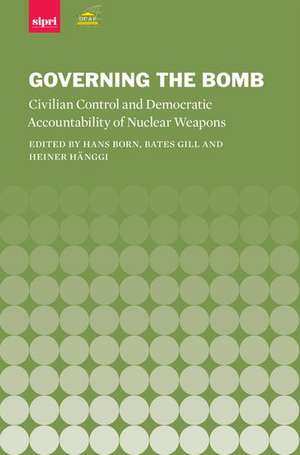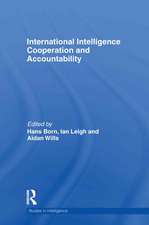Governing the Bomb: Civilian Control and Democratic Accountability of Nuclear Weapons: SIPRI Monographs
Editat de Hans Born, Bates Gill, Heiner Hänggien Limba Engleză Hardback – 21 oct 2010
Din seria SIPRI Monographs
- 47%
 Preț: 564.23 lei
Preț: 564.23 lei -
 Preț: 422.29 lei
Preț: 422.29 lei - 31%
 Preț: 395.24 lei
Preț: 395.24 lei - 51%
 Preț: 787.84 lei
Preț: 787.84 lei - 46%
 Preț: 348.59 lei
Preț: 348.59 lei - 30%
 Preț: 661.89 lei
Preț: 661.89 lei - 30%
 Preț: 689.24 lei
Preț: 689.24 lei - 50%
 Preț: 748.17 lei
Preț: 748.17 lei - 50%
 Preț: 617.05 lei
Preț: 617.05 lei - 30%
 Preț: 492.81 lei
Preț: 492.81 lei - 47%
 Preț: 552.51 lei
Preț: 552.51 lei - 50%
 Preț: 672.32 lei
Preț: 672.32 lei - 30%
 Preț: 601.15 lei
Preț: 601.15 lei - 34%
 Preț: 1625.53 lei
Preț: 1625.53 lei - 68%
 Preț: 390.45 lei
Preț: 390.45 lei - 45%
 Preț: 493.33 lei
Preț: 493.33 lei - 47%
 Preț: 599.10 lei
Preț: 599.10 lei - 47%
 Preț: 339.43 lei
Preț: 339.43 lei - 30%
 Preț: 907.46 lei
Preț: 907.46 lei - 31%
 Preț: 471.14 lei
Preț: 471.14 lei - 44%
 Preț: 153.79 lei
Preț: 153.79 lei - 22%
 Preț: 312.57 lei
Preț: 312.57 lei - 19%
 Preț: 258.29 lei
Preț: 258.29 lei - 46%
 Preț: 479.08 lei
Preț: 479.08 lei - 23%
 Preț: 247.93 lei
Preț: 247.93 lei - 30%
 Preț: 853.57 lei
Preț: 853.57 lei - 45%
 Preț: 482.80 lei
Preț: 482.80 lei - 34%
 Preț: 1204.51 lei
Preț: 1204.51 lei - 34%
 Preț: 1084.59 lei
Preț: 1084.59 lei - 50%
 Preț: 783.52 lei
Preț: 783.52 lei - 34%
 Preț: 950.05 lei
Preț: 950.05 lei - 34%
 Preț: 1112.75 lei
Preț: 1112.75 lei - 47%
 Preț: 343.49 lei
Preț: 343.49 lei - 47%
 Preț: 357.62 lei
Preț: 357.62 lei - 34%
 Preț: 849.37 lei
Preț: 849.37 lei - 47%
 Preț: 646.79 lei
Preț: 646.79 lei - 34%
 Preț: 1113.32 lei
Preț: 1113.32 lei - 30%
 Preț: 628.34 lei
Preț: 628.34 lei - 41%
 Preț: 338.95 lei
Preț: 338.95 lei - 30%
 Preț: 941.04 lei
Preț: 941.04 lei - 26%
 Preț: 334.26 lei
Preț: 334.26 lei - 34%
 Preț: 1112.27 lei
Preț: 1112.27 lei - 30%
 Preț: 1084.90 lei
Preț: 1084.90 lei - 31%
 Preț: 472.11 lei
Preț: 472.11 lei - 50%
 Preț: 644.30 lei
Preț: 644.30 lei - 34%
 Preț: 1086.63 lei
Preț: 1086.63 lei - 38%
 Preț: 299.64 lei
Preț: 299.64 lei - 34%
 Preț: 1015.39 lei
Preț: 1015.39 lei - 50%
 Preț: 728.74 lei
Preț: 728.74 lei
Preț: 599.12 lei
Preț vechi: 858.97 lei
-30% Nou
Puncte Express: 899
Preț estimativ în valută:
114.64€ • 119.69$ • 94.88£
114.64€ • 119.69$ • 94.88£
Carte tipărită la comandă
Livrare economică 24-31 martie
Preluare comenzi: 021 569.72.76
Specificații
ISBN-13: 9780199589906
ISBN-10: 0199589909
Pagini: 264
Dimensiuni: 163 x 236 x 26 mm
Greutate: 0.56 kg
Editura: OUP OXFORD
Colecția OUP Oxford
Seria SIPRI Monographs
Locul publicării:Oxford, United Kingdom
ISBN-10: 0199589909
Pagini: 264
Dimensiuni: 163 x 236 x 26 mm
Greutate: 0.56 kg
Editura: OUP OXFORD
Colecția OUP Oxford
Seria SIPRI Monographs
Locul publicării:Oxford, United Kingdom
Recenzii
This important book advances public knowledge of the domestic governance of nuclear weapons and weapon programmes. It tells us, to the extent possible given endemic secrecy, about the actors and processes involved in decisions pertaining to them ... The standard of analysis is high throughout.
Notă biografică
Dr Hans Born (The Netherlands) is a senior fellow at the Geneva Centre for the Democratic Control of Armed Forces (DCAF). He has conducted policy studies in the area of human rights, accountability and security sector governance for the United Nations, the Organisation for Security and Co-operation in Europe, the Council of Europe and the European Parliament. In addition, he is a guest lecturer for the ETH Zurich Master of Advanced Studies on Security Policy and Crisis Management. Born received an MA degree in public administration from Twente University and a PhD in social sciences from the University of Tilburg. Dr Bates Gill (United States) is director of Stockholm International Peace Research Institute (SIPRI). Prior to being named the SIPRI director in 2007, Gill held the Freeman Chair in China Studies at the Center for Strategic and International Studies in Washington, DC, from 2002. He has previously held positions at the Brookings Institution, where he was the inaugural director of the Center for Northeast Asian Policy Studies, and at the James Martin Center for Nonproliferation Studies of the Monterey Institute of International Studies. He is a member of the Council on Foreign Relations and the International Institute for Strategic Studies and has consulted for a number of multinational corporations and government agencies. Gill received his PhD in foreign affairs from the University of Virginia. Dr Heiner Hänggi (Switzerland) is assistant director and head of research at the Geneva Centre for the Democratic Control of Armed Forces (DCAF). He is also an associate fellow at the Geneva Centre for Security Policy (GCSP) and an associate professor of political science at the University of St Gallen, where he teaches courses on security governance, Asia-Pacific security, and democracy and foreign policy. His recent research and publications focus on the concepts of security sector governance and security sector reform, and on the role of inter-regionalism in international relations. Most recently, he has been working with the United Nations and its member states on the development of a UN policy for security sector reform. Hänggi received his PhD in international affairs from the University of St Gallen.











